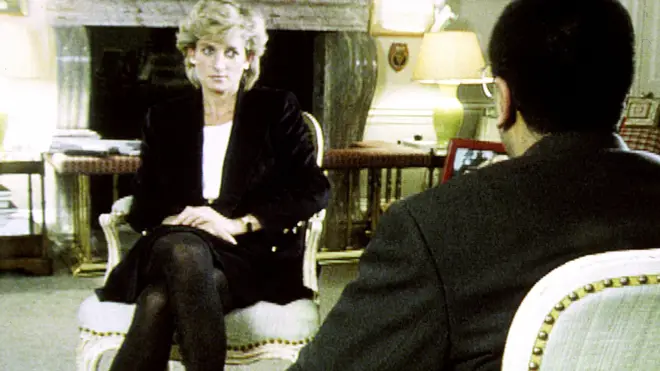
Iain Dale 7pm - 10pm
20 May 2021, 14:19 | Updated: 20 May 2021, 20:49

Journalist Martin Bashir used fabricated bank statements to 'deceive' Princess Diana's brother to secure his bombshell 1995 interview with her, a report has found.
The BBC has issued a "full and unconditional" apology for what it described as "unacceptable failures" in how Bashir secured the interview.
The corporation sent letters of apology from director general Tim Davie to the Queen, Prince Charles and Princes William and Harry for the deceit behind the Diana interview.
The landmark report concluded Bashir “deceived and induced” Earl Spencer into arranging the Panorama interview.
Key findings from the landmark report:

Bashir used ‘deceitful behaviour’ to secure Diana Panorama interview
In the interview Diana famously declared that “there were three of us in this marriage,” in a reference to Prince Charles’s ongoing relationship with his now wife Camilla.
Bashir stepped down as the BBC's religion editor last Friday due to ongoing health issues.
He responded to Lord Dyson's report in a statement today: "This is the second time that I have willingly fully co-operated with an investigation into events more than 25 years ago.
"I apologised then, and I do so again now, over the fact that I asked for bank statements to be mocked up. It was a stupid thing to do and was an action I deeply regret. But I absolutely stand by the evidence I gave a quarter of a century ago, and again more recently.
"I also reiterate that the bank statements had no bearing whatsoever on the personal choice by Princess Diana to take part in the interview.
"Evidence handed to the inquiry in her own handwriting (and published alongside the report today) unequivocally confirms this, and other compelling evidence presented to Lord Dyson reinforces it.
"In fact, despite his other findings, Lord Dyson himself in any event accepts that the princess would probably have agreed to be interviewed without what he describes as my 'intervention'.
"It is saddening that this single issue has been allowed to overshadow the princess' brave decision to tell her story, to courageously talk through the difficulties she faced, and, to help address the silence and stigma that surrounded mental health issues all those years ago.
"She led the way in addressing so many of these issues and that's why I will always remain immensely proud of that interview."
Lord Birt, director-general of the BBC at the time of the interview, said in a statement: "We now know that the BBC harboured a rogue reporter on Panorama who fabricated an elaborate, detailed but wholly false account of his dealings with Earl Spencer and Princess Diana.
"This is a shocking blot on the BBC's enduring commitment to honest journalism; and it is a matter of the greatest regret that it has taken 25 years for the full truth to emerge.
"As the director-general at the time, I offer my deep apologies to Earl Spencer and to all others affected."
BBC's current director-general Tim Davie has said the corporation accepts "in full" the finding of Lord Dyson's report into the 1995 Panorama interview with Diana, Princess of Wales.
Lord Dyson, the former master of the rolls and head of civil justice, was appointed to look into the circumstances surrounding the 1995 interview, during which Diana famously spoke about her "crowded marriage".
Davie said in a statement: "I would like to thank Lord Dyson. His report into the circumstances around the 1995 interview is both thorough and comprehensive. The BBC accepts Lord Dyson's findings in full.
"Although the report states that Diana, Princess of Wales, was keen on the idea of an interview with the BBC, it is clear that the process for securing the interview fell far short of what audiences have a right to expect. We are very sorry for this. Lord Dyson has identified clear failings.
"While today's BBC has significantly better processes and procedures, those that existed at the time should have prevented the interview being secured in this way. The BBC should have made greater effort to get to the bottom of what happened at the time and been more transparent about what it knew.
"While the BBC cannot turn back the clock after a quarter of a century, we can make a full and unconditional apology. The BBC offers that today."